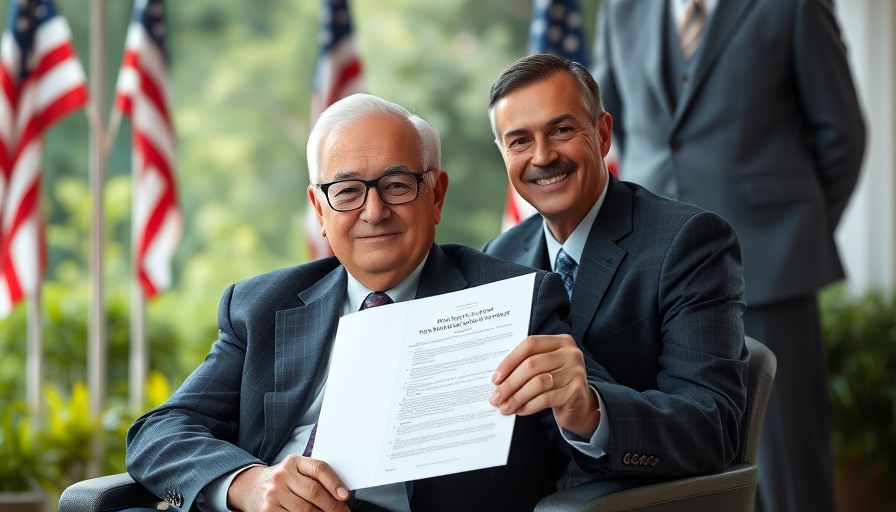
Understanding Trump's Tariffs: What They Mean for the US Economy
On a pivotal Wednesday, President Donald Trump took a bold step in U.S. trade policy, announcing sweeping new tariffs affecting nearly all imports into the country. This decisive action, aimed at approximately 10% for most goods and even higher for nations with significant trade deficits, has ignited a firestorm of debate within Congress and among economists. In addition to the general tariff, a specific 25% levy on foreign-made automobiles has sparked particular concern for a sector already reeling from supply chain disruptions.
The Mixed Response from Lawmakers
Reactions on Capitol Hill remain divided. While many Republican lawmakers either support the tariffs or are prepared to watch how they unfold, voices of dissent are emerging. Senator John Kennedy of Louisiana has been outspoken in defense of the proposed tariffs, asserting that conventional economic forecasts often miss the mark. "Nobody knows. Nobody knows. But we'll find out pretty soon," Kennedy stated. His viewpoint reflects a common sentiment among proponents who believe in taking an aggressive stance against perceived unfair trade practices.
In contrast to Kennedy’s support, Senator Rand Paul has voiced his concerns more pointedly. Just prior to the announcement, Paul warned that these tariffs represent a dangerous precedent for executive overreach, and he described tariffs as detrimental taxes that could lead to soaring prices for everyday Americans. His warning resonates with those who fear the historical failures of previous tariffs, invoking memories of the Smoot-Hawley Tariff of 1930, which many argue contributed to the Great Depression.
What History Teaches Us About Tariffs
The historical context surrounding tariffs is crucial for understanding the current situation. The Smoot-Hawley Tariff, implemented in the early 1930s, was designed to protect American industries by levying high tariffs on imported goods. Instead, it resulted in retaliatory tariffs from other countries, drastically reducing international trade and exacerbating the economic downturn. This historical perspective adds weight to the arguments against Trump's tariffs. Many economists believe we are on the precipice of making the same mistakes, risking higher consumer costs and potential trade wars.
Business Leaders Weigh In
As lawmakers debate the new tariffs, business leaders are expressing their concerns in increasingly vocal terms. The auto industry, for one, sits at the heart of the storm. Many industry experts worry that imposing a 25% tariff on imported cars will lead not only to higher vehicle prices but also to job losses across the manufacturing and supply chain sectors. Ford and General Motors have already cautioned that if raw materials prices inflate due to tariffs, detrimental effects could ripple through their operations.
The Economic Stakes
It's important to consider the broader economic implications of these tariffs beyond partisan divides in Congress. Some estimates predict that consumer prices may rise significantly as import costs increase, impacting everything from electronics to food products. A recent report indicated that an average American household could see an extra $1,000 in expenses each year, due to the upward pressure on prices linked to the implementation of these tariffs.
Moreover, the potential for retaliation from trading partners could heighten tensions, leading to a chaotic environment for businesses that rely on a stable, predictable trading landscape. Countries like Canada have already indicated that they may respond with their own tariffs on U.S. goods, which could thrust the economy into a spiral of reciprocal trade penalties.
What Comes Next for the US?
The future remains uncertain as the new tariffs are set to take effect. Analysts are closely monitoring the response not only from lawmakers but also from the global market. The Trump administration might find itself at a crossroads, balancing aggressive trade tactics that appeal to certain voter bases against the economic repercussions that could unfold. As we move forward, the country's economic fate may hang in the balance, reliant on both domestic political maneuvering and international reactions.
The ongoing debates within Congress and among American businesses hold significant implications for the country’s economic future. With legislative proposals flowing that seek to counteract Trump's tariffs, including potential bipartisan measures emerging in the Senate, it is clear that this issue will remain in the spotlight for the foreseeable future. Understanding these dynamics is crucial for consumers and businesses alike.
 Add Row
Add Row  Add
Add 




 Add Row
Add Row  Add
Add 








Write A Comment